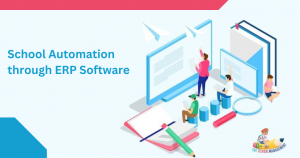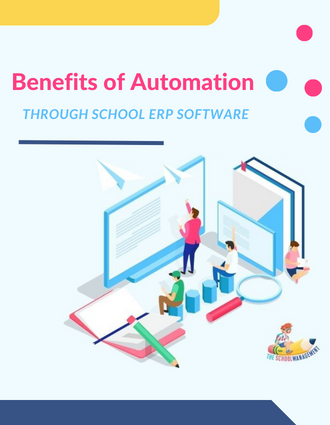The utilization of technology has dramatically transformed the operations and activities of schools and colleges. The implementation of the best school ERP software has enabled educational institutions to effectively manage their internal and external resources, daily tasks, and control processes.
With a specialized suite of tools designed for education, ERP software allows schools to modernize and streamline their day-to-day processes. By seamlessly integrating all departments into a centralized system, the software minimizes errors, automates repetitive tasks, and improves the overall efficiency of staff.
In essence, educational ERP software is an indispensable tool that enhances and optimizes school operations. Let’s dive in and take a closer look at how the ERP system can help schools in the long run.
What is School ERP Software?
ERP software for schools also referred to as school enterprise resource planning software, is a comprehensive solution that enables educational institutions to manage a broad range of day-to-day activities and tasks. Leveraging a dedicated school management system can help institutes have a better hold on their processes.
The software operates by integrating multiple applications or tools that work seamlessly together to connect various departments and consolidate data from diverse sources into a centralized and accessible database.
This database provides easy access to a large amount of information, which can aid in efficient decision-making and effective management of school operations.
By implementing ERP software, educational institutions can extensively streamline their processes and reduce the time and effort required for administrative and academic tasks.

Top-Notch Benefits of Automation Through School ERP Software
1. Boost Productivity
The impact of school management ERP software can greatly improve the efficiency of educational institutions by automating daily tasks like student enrollment, library management, exams and results, etc. Automation frees up staff time to focus on other important tasks, leading to higher productivity and efficiency.
This unique software enables the integration of all departments into a centralized system, eliminating the need for separate systems. It also plays a key role in reducing errors and redundancies, streamlines the workflow, and provides better services to students, teachers, and staff while saving time and resources.
By providing real-time data and analytics, the school ERP system allows administrators to monitor and manage the institution’s performance. This data analysis helps identify areas for improvement, allowing for the implementation of data-driven strategies that lead to better decision-making and improved outcomes for students.
2. Facilitates Better Teacher-student collaboration
By implementing ERP software for schools, educational institutions can promote improved student-teacher collaboration by providing a seamless platform for easy communication and interaction between them.
The best school ERP software enables teachers to share learning materials, offer real-time feedback, and connect with students, creating an enriched learning environment. Additionally, it offers a platform for students to ask questions, share ideas, and work collaboratively on group projects, thereby improving student engagement and learning outcomes.
Furthermore, The educational ERP software features tools such as grade books and attendance tracking, which provide teachers with insights into individual student progress and engagement, enabling personalized feedback and support to be provided to students.
Parents can also monitor their child’s progress and communicate with teachers through the software, fostering a sense of collaboration and engagement among all stakeholders.
3. Easily Accessible
Online school management software is usually web-based, allowing users to access it from anywhere with an internet connection, regardless of their device or location. This feature provides convenience and flexibility for teachers, students, and administrators, who can access the software from home while travelling, or at any other location.
With remote learning becoming more common, the ability to access the school ERP system from anywhere has become increasingly important.
Furthermore, this feature allows parents to stay connected with the school community and track their child’s progress, regardless of their location. The accessibility of ERP software from anywhere enhances connectivity and convenience for all users.
It eliminates the need for physical presence and saves time, making it easier for teachers and administrators to complete administrative tasks and respond to student needs. Students can also access learning materials and collaborate with their peers from anywhere, creating a more engaging and effective learning experience.
4. Paperless Working
ERP software promotes a paperless working environment by streamlining administrative and academic tasks through digitization. ERP software for schools allows for the electronic creation, processing, and storage of documents, forms, and other paperwork, eliminating the need for printing and physical storage, thereby reducing paper usage and costs while promoting environmental sustainability.
Additionally, automation of attendance tracking, grade recording, and fee management through the software reduces the need for manual data entry and paperwork, saving time and resources while minimizing errors. This approach makes schools more organized, efficient, and eco-friendly, promoting sustainability and reducing their environmental impact.
The ability of ERP software to digitize and automate tasks provides a cost-efficient, effective, and sustainable approach to managing administrative and academic tasks, leading to a more efficient and environmentally responsible educational system.
5. Improves Communication
It is interesting to note that ERP software streamlines communication by providing a centralized platform for all users, including teachers, students, administrators, and parents.
With online school management software, users can easily communicate with each other through various channels such as messaging, chat, and email, making communication quick and efficient and reducing the likelihood of miscommunication.
Real-time communication between teachers and students is also enabled, allowing for prompt feedback and addressing of any concerns. The software can provide regular updates to parents about their child’s academic progress, attendance, and other relevant information, fostering collaboration and engagement between parents and the school community.
Improved communication provided by ERP software creates a more connected and engaged educational environment, resulting in better academic outcomes and a more positive learning experience for all stakeholders.
Wrapping Up
So, this was all you needed to know about some of the most sought-after benefits of automation through ERP software for schools. You can easily streamline your processes and increase the overall efficiency of the institute.
Whether it is managing the routine tasks by the faculty or tracking the academic performances of each student— ERP systems can certainly be a game-changer. Proctur can provide you with the best-in-class ERP systems that are perfect for your institute’s growth.



